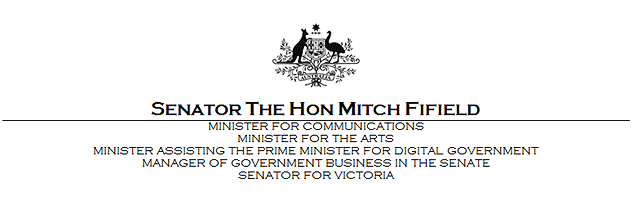with Greg Jennett.
1 October 2015
1:00pm
E & OE
Subjects: Sky Muster Launch, NBN.
JENNETT:
Minister, congratulations on the launch. To borrow your phrase, “Thunderbirds are go”, the rocket has launched and what is the explanation given to you, was it a textbook performance?
FIFIELD:
Well, everyone associated with the satellite launch is breathing a sigh of relief. While the risks were low, because this is a space venture, there are always some risks. So, there is still a lot of work to do, the satellite has to move into orbit, there is a fair bit of technical work that needs to occur before Australians in regional and remote areas can start to receive fast broadband services in the first half of next year.
JENNETT:
Now, let’s talk about those services and the speeds being offered. I think the phrase used is up to 25 Mb per second. Is that as good as it gets? And how many customers will actually get that and a guaranteed speed?
FIFIELD:
Well, it is up to 25 Mb per second because there no doubt will be a range of product offerings that may be at different speeds. But, there is the capacity to have 400,000 Australians and businesses in remote and regional areas, and that also includes Australian offshore territories, to be connected to the NBN. This is a dramatic and significant improvement on the broadband speeds which are currently available. And, importantly, it will mean that there are many Australians who will have greater choice in terms of where to live and where they want to do their business.
JENNETT:
But, will that theoretical speed, up to 25 Mb per second, be the way when more customers are connected? You are saying up to 400,000, is it still possible to get those speeds as the customer numbers expand?
FIFIELD:
Well, obviously with satellite it has a finite capacity. So it is important for NBN Co to manage that capacity. And so there will be differential pricing for people who have high volume needs to ensure that there is capacity for people who use the NBN in an everyday sense. And it is particularly important to make sure that we maintain capacity for public interest uses such as long-distance education, E health. So, it is a management exercise to make sure that there is fair use and my department and NBN will be putting a lot of work into ensuring that we have a good fair use policy.
JENNETT:
Now, one of the risk management procedures in this is I suppose making sure that you are not overrun by technological developments. Has anyone done an assessment of other work being done by people like Bill Gates, Mike Zuckerberg, Google’s Project Loon. It is all about trying to give global coverage for the internet in remote places. The possibility that those technologies could overrun a fixed asset like this satellite that went up today?
FIFIELD
Well, technology is always moving and we can’t predict with any great specificity where technology will lead and what will be the new breakthroughs of the future. But, that is not a reason not to seek to roll out fast broadband now. As I say, it will be getting out 6 to 8 years earlier, but one of the positives here in relation to the point you raised is the NBN is technology agnostic. The NBN is open to learning and advancing and doing things in a different way. But look, I’m sure that there will always be the need for that satellite capacity that we have.
JENNETT:
Now, on the earthly NBN. You are saying that you are technology agnostic, does that mean that the finished product may not be very much like the original model outlined by Malcolm Turnbull which was fibre to the node and copper wires from there to the premise. Because, there are many suggestions now that the rollout will put a lot more fibre out to the premises then was initially anticipated?
FIFIELD:
Well, because the NBN is technology agnostic, the proportions of the rollout which are achieved through different technologies may change over time. They may change in response to demand, they change in response to technological advances. They change in response to what people are prepared to pay for. So, these are all variables and the NBN will adapt accordingly.
JENNETT:
Alright, Mitch Fifield, congratulations again on a milestone for the project and we will talk to you about portfolio matters again in the future I’m sure.
FIFIELD:
Look forward to it, Greg.
Media contact:
Luisa Anderson | 0417 309 812 | Luisa.anderson@communications.gov.au

